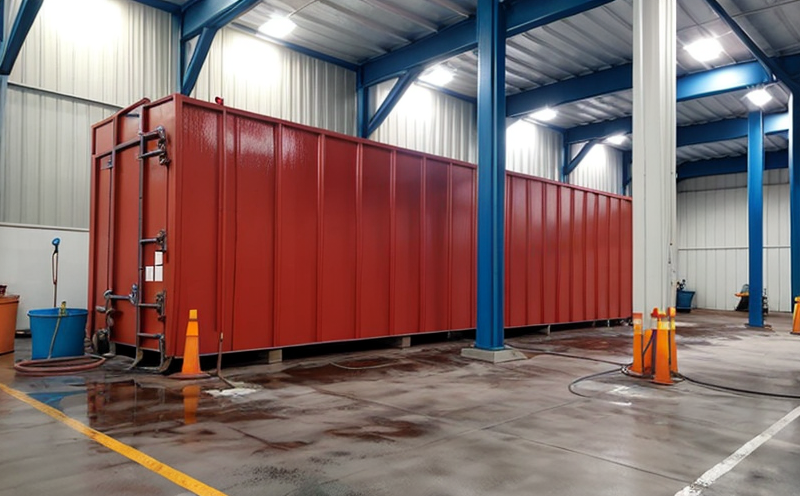ISO 7784 Abrasion Resistance Testing of Paint Films
The ISO 7784 standard provides a comprehensive framework for testing the abrasion resistance of paint films. This critical assessment evaluates how well a given coating can withstand mechanical wear and tear, which is essential in sectors such as industrial manufacturing where durability under harsh conditions is paramount.
Abrasion resistance is particularly important for coatings that are exposed to abrasive environments like those found in automotive manufacturing plants, chemical processing facilities, or outdoor structures. In these settings, the ability of a paint film to resist wear can significantly impact product longevity and operational efficiency. For instance, in industrial machinery where moving parts come into contact with each other, a coating that fails to withstand abrasion can lead to premature failure, increased maintenance costs, and potential safety hazards.
The ISO 7784 method involves using an oscillating sandpaper drum to abrade the surface of the paint film. The test measures the weight loss of the specimen after exposure to this abrasive action. This approach is designed to simulate real-world conditions that a coating might encounter, such as abrasion from moving parts or environmental factors like dust and dirt.
Preparation of specimens for ISO 7784 testing involves ensuring they are representative of the final product in terms of composition and application method. The samples should be cured according to manufacturer specifications and cut into standard sizes suitable for mounting onto the test fixture. Proper specimen preparation is crucial as any deviation from the standard could lead to inaccurate results.
The equipment used for ISO 7784 testing includes an oscillating sandpaper drum capable of maintaining a consistent speed, pressure, and angle of abrading contact with the sample surface. The drum must also ensure uniform abrasion across the entire specimen area. Additionally, precise measurement tools are necessary to accurately measure the weight loss before and after the test.
After conducting the ISO 7784 abrasion resistance tests, the results are analyzed based on the initial and final weights of the specimens. Compliance with specified limits indicates satisfactory performance under abrasive conditions. Results that fall outside acceptable ranges may require further investigation into formulation adjustments or application techniques to enhance durability.
This testing method is not only vital for ensuring product quality but also plays a key role in meeting regulatory requirements and industry standards. By adhering strictly to ISO 7784 guidelines, manufacturers can demonstrate their commitment to producing reliable coatings that meet both internal quality control objectives and external customer expectations.
- Consistent specimen preparation
- Standardized testing equipment
- Precise measurement tools for accurate weight determination
- Compliance with ISO 7784 standards
In conclusion, ISO 7784 abrasion resistance testing is an indispensable tool in the quality assurance toolkit of industrial manufacturers. It ensures that paints and coatings used in various applications are capable of enduring rigorous operational conditions without compromising performance or safety.
Why It Matters
The durability and longevity of paint films directly impact the efficiency and cost-effectiveness of industrial operations across numerous sectors including automotive, aerospace, construction, and marine. Ensuring that paints possess adequate abrasion resistance not only enhances their service life but also reduces maintenance downtime and associated costs.
From an environmental perspective, enhancing abrasion resistance contributes to more sustainable practices by extending the useful lifespan of materials without frequent replacements. This translates into lower waste generation and reduced resource consumption, aligning with broader sustainability goals within industries.
For quality assurance teams responsible for monitoring product performance, ISO 7784 testing offers a standardized approach that allows consistent evaluation across different batches or suppliers of paint films. This consistency helps in identifying potential issues early on during development stages or supply chain management processes.
In summary, investing in robust abrasion resistance testing through methods like ISO 7784 ensures not only compliance with industry standards but also contributes significantly towards achieving higher levels of operational excellence and environmental responsibility within industrial manufacturing environments.
Quality and Reliability Assurance
The importance of quality and reliability in industrial coatings cannot be overstated. Reliable performance under abrasive conditions is crucial for maintaining optimal operating efficiency, reducing maintenance costs, and ensuring safety in various applications. Here are some key points highlighting the significance:
- Preventative Maintenance Costs: Coatings with poor abrasion resistance often require frequent reapplication or replacement, leading to higher maintenance expenses over time.
- Safety Compliance: In environments where safety is paramount, such as chemical processing plants or offshore installations, reliable coatings play a vital role in preventing accidents caused by compromised protective layers.
- Environmental Impact: Sustainable practices are increasingly becoming part of industrial operations. Durability improvements through advanced testing ensure less waste and reduced resource use.
By adhering to stringent quality assurance protocols, including rigorous abrasion resistance tests like those specified in ISO 7784, manufacturers can establish trust with their customers while maintaining competitive advantage in the market.
Customer Impact and Satisfaction
The satisfaction of industrial clients depends greatly on the performance and reliability of products they purchase. Providing paints that meet stringent standards like ISO 7784 enhances customer confidence, leading to increased loyalty and repeat business opportunities.
Customers in industries reliant on robust coatings for protection against harsh conditions appreciate knowing their suppliers prioritize quality assurance. This reassurance fosters long-term partnerships built on mutual respect and shared commitment towards excellence.
In addition to enhanced satisfaction among existing customers, successful adherence to industry standards opens doors for new business ventures. Demonstrating proficiency in testing methods such as ISO 7784 can attract potential clients seeking partners who understand the complexities of industrial environments and their demands.
Ultimately, prioritizing quality assurance not only benefits immediate stakeholders but also contributes positively to the overall reputation and success of a company operating within the industrial manufacturing sector.





